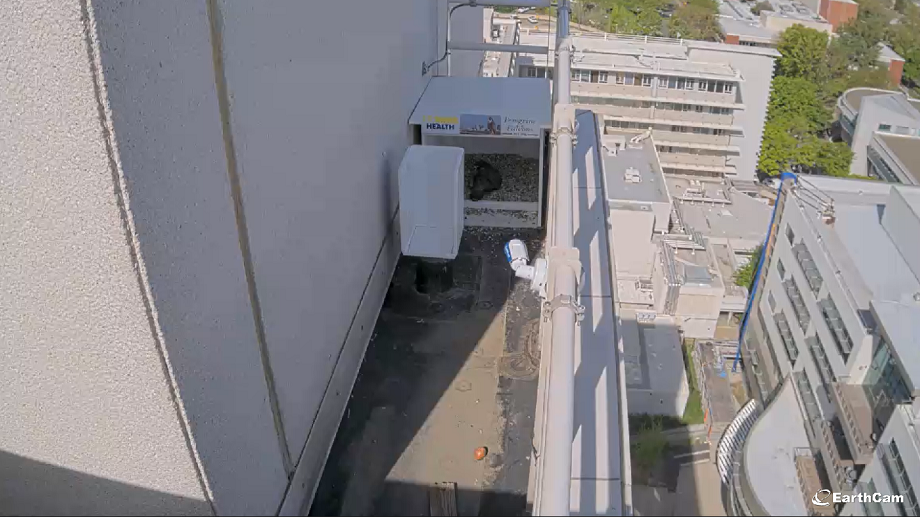Peregrine falcon mystery: Experts weigh in on disappearing eggs
Falcon-eye viewers have been noticing the peregrine eggs disappearing over the last week, with the final egg now lying on the concrete as of Wednesday morning.
As we’ve reported since last month, a pair of peregrine falcons are back to their nest atop UC Davis Medical Center for the sixth season. Their nest is located a safe distance from the hospital's busy helipad. Initially, there were four eggs.
However, about seven days ago, an egg went missing. On April 7, a second egg disappeared, leaving only two remaining inside the nest. Two days later, the third egg went missing. Finally, viewers noticed the fourth and final egg outside of the nest.

So, this begs the question: What is happening with the peregrine falcon eggs?
Before the fourth egg was seen on the ground, we reached out to Michelle Hawkins, the director of the California Raptor Center at UC Davis, to find out more. Hawkins went through our EarthCam footage. EarthCam partners record around the clock; still images are periodically taken from the video footage and logged here.
“Where that nest is, my expectation would be that a predator caused nest upset,” she said. “Other birds, especially ravens and crows, will mob the falcon and try to steal the eggs.”
Hawkins said if a bird were stealing the falcon eggs, it would most likely be during the day. However, no ravens or crows can be seen in any footage.
“It’s likely not a rat because a rat wouldn’t be able to carry the egg away,” she said. “A rat would break the egg and eat it right there, but there’s no visual evidence of a mess.”
Raccoons and cats would be strong enough to carry the eggs away, but Hawkins doubted either animal could get that high up a building and back down, especially without trees to assist.
“A first-time bird mom, sometimes accidents can happen,” Hawkins said. “But this does not look like a first-time mom. She knows what she’s doing, and she’s doing a pretty good job.”
Likewise, the male falcon is the unlikely cause. A different male with this female might break the eggs, but again, there would be visual evidence on camera. Human interference had been ruled out because a human would assuredly be seen on camera.
“This is quite the mystery,” Hawkins said.
UC Davis Health’s Bill Corbett, procurement supervisor by day, falconer by night, provided his guess after speaking with colleagues in the field.
“We are pretty sure the eggs simply cracked, and the parents removed them,” Corbett said before the fourth egg moved.
He indicated the female peregrine is the original female from the beginning when UC Davis Health began keeping tabs on the peregrines, and that could be a factor with fertility.
“Older birds lay smaller eggs and the fertility is not as good,” he said. “It could also be something in her diet that caused egg thinness this year.”
Corbett said in the past, the falcons left the infertile eggs in the nest.
With Wednesday's finding - the final egg removed from the nest - it appears that our experts' theory that it could be the female falcon removing the eggs herself seems to be the most plausible. Update: See the moment the mother falcon removed the final egg here:
“I wish we could control things better, but statistically, we were due for an event like this,” Corbett said.
Corbett said there is some hope the falcons could try again this season.
It appears UC Davis Health isn’t the only place a situation like this has occurred. The Red Deer Advocate in Surrey, British Columbia, for instance, reported a similar occurrence with their peregrine falcons.



